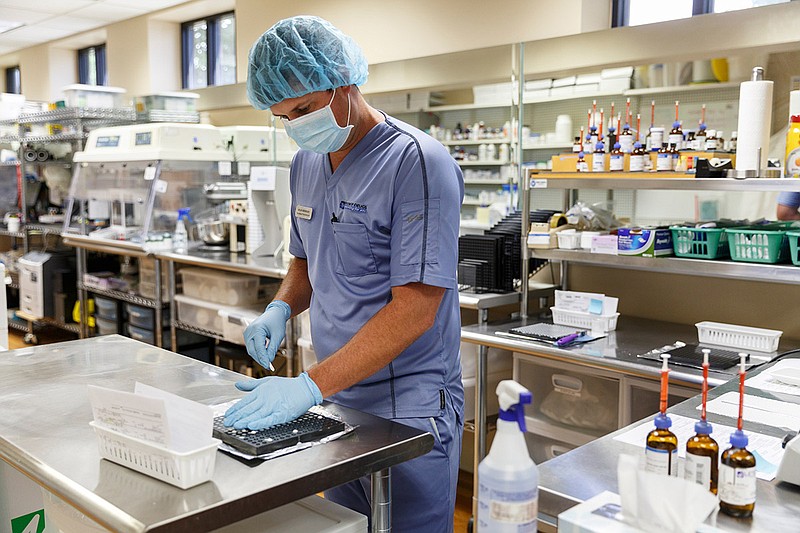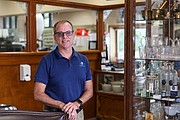Cataract surgery is one of the most common types of surgical procedures in the world, according to the National Institutes of Health. But for it to be successful, patients need to be on a detailed eye drop regimen both before and after the surgery.
The biggest problem? The schedule of when and what eye drops to take can be incredibly confusing to the average person. One bottle is just used in the first week while another lasts an entire month, and certain drops need to be taken at specific times through the day.
After his own wife went through the surgery in 2014, Dr. Robin Brady of SouthEast Eye Specialists became convinced that most patients probably weren't taking the drops correctly.
"She asked me every day how to use the drops correctly - she literally drove me nuts," Brady says. "So, I came up with this idea to put all three drops in one bottle."
But it's not exactly that easy, so Brady recruited the help of Dr. Randy Davis.
Davis owns Designer Drugs, a local compounding pharmacy off Gunbarrel Road that got its start selling hormones and hormone replacement therapy. Davis bought the pharmacy in 2000 when it was called Wellness Pharmacy and was located on Hixson Pike. A little more than 10 years ago, he moved the business to East Brainerd, where Davis approached him in 2014 about creating the simplified eye drop regimen for cataract patients.
"It's not as easy as just dropping all the drops in one bottle and calling it a day," Davis says.
Chemically, Davis had to figure out how to put all the ingredients together - Moxifloxacin, Bromfenac and Dexamethasone - and have it still say in a solution form. The process of creating the new eye drop, called "CatarActive3," has since been patented in the United States by Davis.
Now, patients have one bottle of drops that they take four times a day, and that's all they have to remember. One bottle is more than enough to last them their entire therapy, and it costs $55 a bottle per eye – a sharp decrease from $270 for three bottles for one eye.
"People were canceling their surgery before because they couldn't afford their eye drops," Davis said. "Our eye drops are cheaper than their co-pay if they had insurance. Doctors get to do more surgeries, and patients are getting better therapy."
Brady said they use the new drops on every patient who will agree to it, which is about 98 percent. Davis said 60 percent of what they ship to different states is CatarActive3.
Designer Drugs, at 7304 Jarnigan Road, is not the typical Walgreens or CVS. Just inside the pharmacy's doors is a mini-museum of pharmaceutical equipment used throughout history and Davis' mortar and pestle collection. Designer Drugs has about 26 employees and a lab in back that will undergo a more than $600,000 renovation in the next year to meet new industry standards for handling hazardous materials.
Once done, it will be a big accomplishment for a local pharmacy and perhaps the first lab of its kind in the state of Tennessee. Designer Drugs recently achieved another big feat that many smaller pharmacies usually don't even attempt - getting licensed in all 50 states.
On the break room wall of Designer Drugs is a map of all 50 states that Davis picked up at an RV dealership years ago. Every time Designer Drugs was licensed in a new state, Davis would add a sticker to it until they filled the whole map. It took about five years and tens of thousands of dollars to meet the requirements of all 50 states - California being one of the hardest. Just to maintain licensing everywhere, Designer Drugs spends about $20,000 to $30,000 a year now.
"It was a very difficult accomplishment because the United States is not united at all," Davis jokes. "For some states, I had to actually take the law test. Some states say the pharmacy needs to be licensed, while others want both the pharmacy and pharmacist to be licensed."
But Davis started the process because he said Designer Drugs needed to be able to to ship to every state if they wanted to compete.
Looking back, Davis said it's amazing to think how much they have grown since he took over Wellness Pharmacy 18 years ago. His very first day, Davis filled only eight prescriptions.
A lot has changed since then, including the pharmaceutical industry. Davis said things are much more regulated now, which can require a lot more time and money on the part of Designer Drugs, such as the $600,000 remodel. The pharmacy has a "quality control" lab on site, since every medication they make has to be tested and/or quarantined before it's dispensed.
"Compounding meets the needs of the doctors and the patients. They trust us," Davis says. "We don't want to hurt anybody. We are out here to help people."
Contact staff writer Allison Shirk at ashirk@timesfreepress.com, @Allison_Shirk or 423-757-6651.

